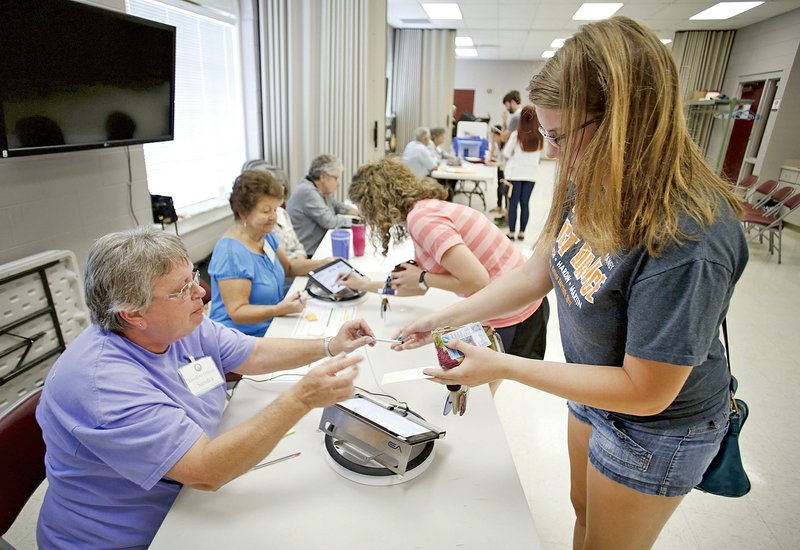FAYETTEVILLE -- In a reversal of a similar special election last year, voters resoundingly ratified the city's Uniform Civil Rights Protection ordinance Tuesday.
Final but unofficial results from the Washington County Election Commission showed 7,666, or 52.8 percent, of voters cast ballots in favor of the contentious anti-discrimination law, and 6,860, or 47.2 percent, voted against it.
The ordinance is scheduled to take effect Nov. 7, provided it withstands a legal challenge from Protect Fayetteville, the group advocating against the pro-LGBT law.
"I think this says that Fayetteville voters really are fair and inclusive folks," said Kyle Smith, president of For Fayetteville, shortly after election results were announced. "I think we proved tonight that this is the Fayetteville we all know and love."
The Uniform Civil Rights Protection ordinance prohibits discrimination in employment, housing and places of public accommodation on the basis of sexual orientation and gender identity. It creates a seven-member, City Council-appointed Civil Rights Commission to review complaints. Violators are subject to fines of up to $100 for the first offense.
Lauren Chadwick, after voting Tuesday at Christ's Church, 525 W. 15th St., said the anti-discrimination ordinance is needed.
"I voted for Fayetteville, because I'm a member of the LGBT community, and we need equal rights just like anybody else," Chadwick said. "I don't want my landlord to kick me out of my rent house because I'm gay. I don't want to lose my job because I'm gay. I don't want to be on a date with my partner and be refused service because of my sexual orientation. That's silly."
Charlie Gilbeau, who cast his ballot at Genesis Church, 205 W. Martin Luther King Jr. Blvd., said Tuesday's election was much more straightforward than a Dec. 9 referendum on the previous Civil Rights Administration ordinance, which also sought to offer protections for gay, lesbian, bisexual and transgender residents.
Gilbeau said he thought the previous referendum, in which residents were asked to vote for or against repeal instead of for or against the ordinance in question "was obviously worded in an attempt for confusion."
About 13 more people cast ballots in Tuesday's election than in a Dec. 9 referendum, when nearly 52 percent of the 14,580 residents who voted called for repeal of an earlier anti-discrimination proposal.
Turnout was 14,593, or 29.4 percent, of the 49,634 residents who were eligible to vote Tuesday.
Even with Tuesday's election result, the future of the Uniform Civil Rights Protection ordinance is unknown.
Protect Fayetteville representatives on Aug. 31 filed a lawsuit seeking to void the ordinance. The group alleged the ordinance was improperly referred to voters at a June 16 City Council meeting. And, they claimed, the ordinance is illegal under Act 137, which prohibits cities and counties from enacting or enforcing legislation "that creates a protected classification or prohibits discrimination on a basis not contained in state law."
City Attorney Kit Williams has refuted the group's claims.
The Arkansas Civil Rights Act of 1993 prohibits discrimination on the basis of race, religion, gender, national origin and disability but not based on someone's sexual orientation or gender identity. However, sexual orientation and gender identity are referenced in another section of state law that deals with bullying in public schools.
"The protected classifications are certainly there in state law, and, therefore, this is not a new protected classification," Williams said last week. He went on to question whether Act 137 was constitutional under the equal protection clause of the U.S. Constitution's 14th Amendment.
Washington County Circuit Judge Doug Martin, as of Tuesday, hadn't set a court date to hear arguments in the case.
NW News on 09/09/2015

